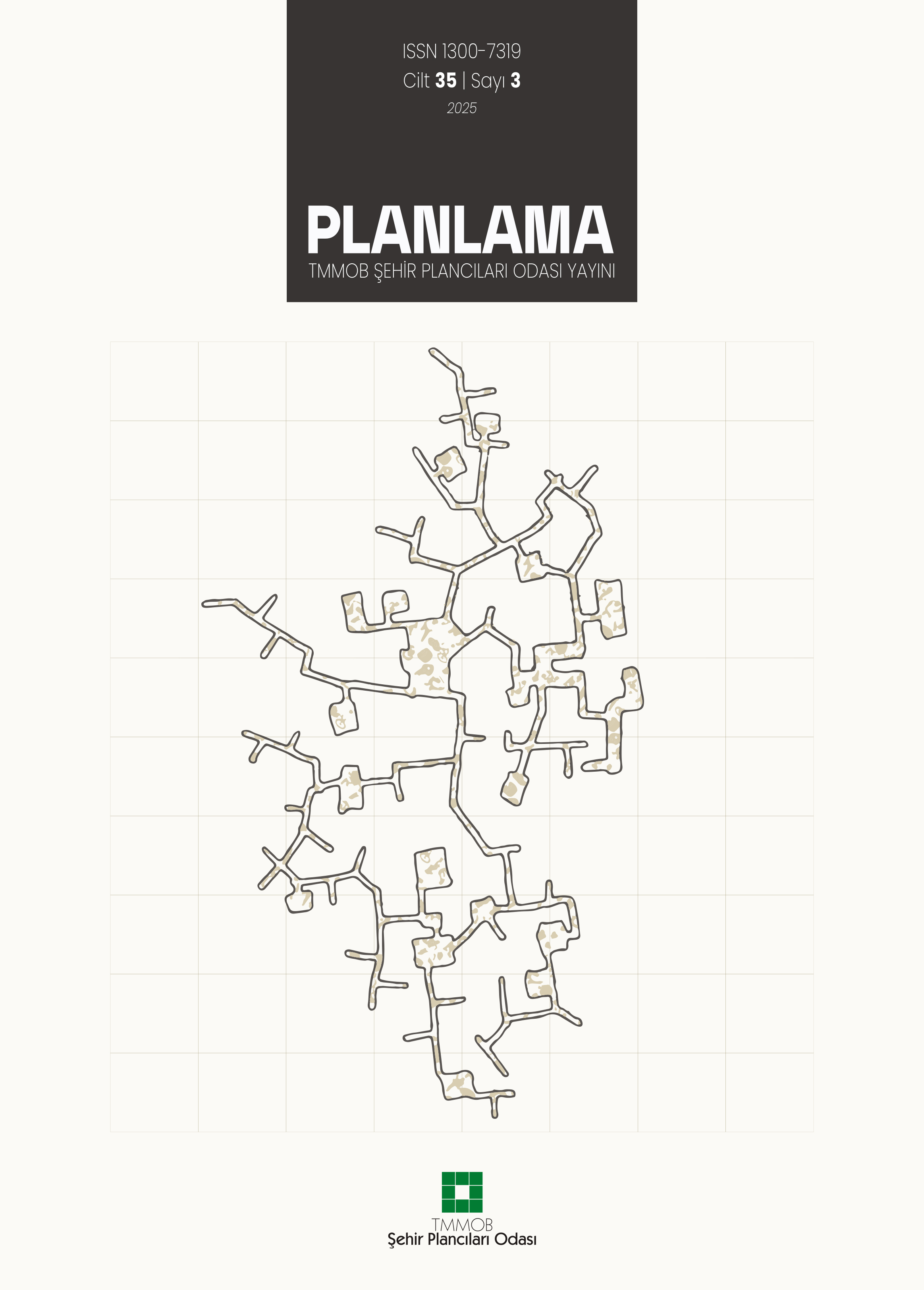Kır-Kent Çeperinde İklime Duyarlı Planlama Yaklaşımı: Denizli Örneği
Gamze Aşıcı1, Aysun Aygün Oğur2, Dalya Hazar31Pamukkale Üniversitesi Mimarlık ve Tasarım Fakültesi, Şehir ve Bölge Planlama Anabilim Dalı, Denizli, Türkiye2Pamukkale Üniversitesi Mimarlık ve Tasarım Fakültesi, Şehir ve Bölge Planlama Anabilim Dalı, Denizli, Türkiye; Florida Üniversitesi, Tasarım, İnşaat ve Planlama Fakültesi, Şehir ve Bölge Planlama Anabilim Dalı, Gainesville/Florida, ABD
3İzmir Büyükşehir Belediyesi, Strateji Geliştirme Dairesi Başkanlığı, İzmir Planlama Ajansı, İzmir, Türkiye
Kentsel ve kırsal alanlar iklim değişikliğinin etkilerine karşı kırılgan bir yapıdadır. Sosyo-mekânsal yapısı itibariyle iklim değişikliğine bağlı yaşanan doğa olaylarından olumsuz etkilenmektedir. Kırılgan yapıları göz önüne alındığında sosyal ve mekânsal dayanıklılığı arttırmak iklim değişikliği ile mücadele sürecinde önem kazanmış durumdadır. Bu bakımdan yerel düzeyde gerçekleştirilen eylemlere yön verecek, kentsel ve kırsal alanları bütüncül bir yaklaşımla ele alacak yöntem ve stratejilere ihtiyaç bulunmaktadır. Bu ihtiyaçtan yola çıkarak bu çalışma iklim değişikliği ile mücadele sürecinde kentsel ve kırsal alanların bütüncül yaklaşımla değerlendirilmesi ve önemli bir geçiş bölgesi olan kır-kent çeperinin iklim değişikliği ile mücadele sürecindeki öneminin ortaya koyulmasını amaçlamaktadır. Bu amaç doğrultusunda ‘‘Kır-kent çeperinin iklim değişikliği karşısındaki kırılganlıkları ve potansiyelleri nelerdir?’’ ve ‘‘Kır-kent çeperi iklime uyumlu nasıl planlanabilir?’’ sorularına Denizli kır-kent çeperi örneği üzerinden yanıt aranmaktadır. Yapılan çalışma ile öncelikle iklim değişikliğine karşı uyum/risk faktörlerini değerlendirmek amacıyla bir kriter seti tanımlanmış ve odaklanılan kriterler doğrultusunda Denizli’nin gelişme eğilimleri incelenerek çeper bölge üzerinden seçilen bir alt bölgede alan araştırması yapılmıştır. Mekânsal gözlem ve derinlemesine görüşmeler yoluyla çalışma alanının sosyo-mekânsal özellikleri, gelişme eğilimi ve gelecek öngörüleri tespit edilmiş, sorun ve potansiyelleri sorgulanmış, sonuçta iklime duyarlı planlama stratejileri tartışılmıştır. Yapılan çalışma ile iklime dayanıklı ve sürdürülebilir kırsal-kentsel çevreler planlanmasına ilişkin genel bir çerçeve tanımlanmakta ve Denizli gibi orta ölçekli kentler için örnek bir iklime uyumlu planlama yaklaşımı/rehberi ortaya konmaktadır.
Anahtar Kelimeler: Denizli, iklim değişikliğine uyum, kent planlama, kır-kent çeperi.
Climate Compatible Planning Approach in Rural-Urban Fringe: The Case of Denizli
Gamze Aşıcı1, Aysun Aygün Oğur2, Dalya Hazar31Department of City and Regional Planning, Pamukkale University Faculty of Architecture and Design, Denizli, Türkiye2Department of City and Regional Planning, Pamukkale University, Denizli, Türkiye; University of Florida, College of Design, Construction and Planning, Department of Urban and Regional Planning, Gainesville/Florida, USA
3Izmir Metropolitan Municipality, Strategy Development Department Izmir Planning Agency, İzmir, Türkiye
Urban and rural areas are highly vulnerable to the effects of climate change and are adversely impacted by the natural disasters it causes. Given their fragile structure and current impacts, enhancing social and spatial resilience has become crucial in the process of combating climate change. To address this, there is a need for methods and strategies that guide local actions and take a holistic approach to both urban and rural areas. This study aims to examine urban and rural areas from a comprehensive perspective in the context of combating climate change and to highlight the significance of the rural-urban fringe, an important transitional zone, in this process. Specifically, the research seeks to answer the following questions: "What are the vulnerabilities and potentials of the rural-urban fringe in the fight against climate change?" and "How can the rural-urban fringe be planned to adapt to climate change?" Denizli rural-urban fringe serves as a case study to explore these questions. The study first established criteria for evaluating adaptation and risk factors related to climate change. A field study was then conducted in a sub-region selected from the periphery of Denizli, based on the city's development trends and the established criteria. Through spatial observations and in-depth interviews, the socio-spatial characteristics, development trends, and future projections of the study area were identified, with its problems and potentials analyzed. Based on this analysis, adaptive planning strategies were proposed. Ultimately, the study presents a framework for planning climate-resilient and sustainable rural-urban environments and offers a climate-responsive planning approach/guideline for medium-sized cities such as Denizli.
Keywords: Denizli, climate change adaptation, urban planning, rural-urban fringe.
Makale Dili: Türkçe














